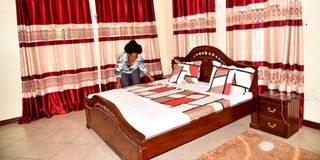Airbnbs, hotels tussle amid county bid to rein in sector

Airbnb Vacation Rentals owner Corazon Chepkemboi prepares a bed for guests at the facility that is located on Beach Road in Nyali, Mombasa, in March 2019.
What you need to know:
- Nyali has the highest number of Airbnbs according to data by Coast Holiday Homes.
A push by the Kwale county government to regulate the alternative accommodations sub-sector in the hospitality industry has lifted the lid on a behind-the-scenes push-and-pull between investors in Airbnbs and hotels in the Coast region.
Hoteliers, who are struggling to fill the over 50,000 beds across the region, have welcomed the move announced by Tourism and Trade Executive Michael Mutua yesterday, as Governor Fatuma Achani’s administration eyes the millions of shillings in potential revenues to be earned from the lucrative trade.
High-end Airbnb’s in Diani are mainly owned by rich foreigners, with the most expensive charging up to Sh439,000 a night for a five-bedroom beachfront home.
Boost security
Mr Mutua said the new regulations target Airbnbs, villas and private homes. Addressing hoteliers from the idyllic tourism destination that is famed for its award-winning beach hotels, the official said regulating the sector will also boost security.
“Allowing them to thrive unregulated will kill hotels,” he said.
An Airbnb owner, who owns two villas that earn more than Sh300,000 a month during the high season, opposed the move.
“I charge Sh30,000 per night in my Nyali apartment inclusive of a chef and a servant who also doubles up as a driver. Why would I pay taxes to the county government yet it’s my own home? I think the county government should support our businesses instead of trying to kill them,” she told Nation.
Kenya Association of Hotelkeepers and Caterers (KAHC), Coast Executive Sam Ikwaye said hoteliers pay to the Tourism Fund two per cent of their gross sales while Airbnb owners don’t pay anything.
“The Tourism Fund is instrumental in marketing a destination, training institutions and developing manpower. It is a revolving fund for hospitality development. Airbnbs should contribute to the development of the industry,” Dr Ikwaye. He urged the Tourism Regulatory Authority (TRA) to work with counties to regulate Airbnbs. However, to ensure counties get revenue, the expert said the devolved units should handle enforcement.
Dr Ikwaye, however, said alternative accommodation facilities should be supported for revolutionising the tourism sector.
“It is adding value to a vibrant destination by bringing colour, variety and diversity. Our only concern is that regulation must kick in because, without adequate regulation and enforcement, we might incur losses due to a lot of social evils associated with the travel industry,” he said.
Coast Holiday Homes chief executive Habel Mwakio said Airbnb owners also pay taxes to the government.
“We are regulated and we pay taxes. Owners of Airbnbs are supposed to pay the Sh9,000 licensing fee to TRA, whose officials inspect the premises and offer guidance on paying the taxman,” explained Mr Mwakio.
‘Public participation’
“Have they done public participation [on the proposed regulations]?” Mr Mwakio posed, lamenting that the regulations will kill the alternative accommodation industry.
“The county and national governments should stop double taxation. Counties should come up with policies that make businesses thrive,” he said.
Imposing additional levies, he asserted, “means the rates of Airbnb will go up and customers will incur the costs.”
“Counties should understand that this business has employed thousands including chefs, cleaners, taxi drivers, beach boys, masseurs swimming pool attendants, waiters and waitresses, technicians including plumbers, electricians,” he added.
Nyali has the highest number of Airbnbs according to data by Coast Holiday Homes.
“Nyali is the capital city of Airbnbs, there are close to 700, followed by Diani, Watamu and Malindi,” said Mr Mwakio.





